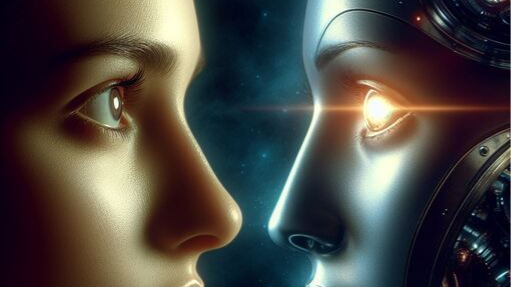By Deanna Huff, Th.M., Ph.D. | March 9, 2024
(Picture generated from Microsoft Design)
Introduction
Ben Mitchell and John Kilner wrote, “If the nineteenth century was the age of the machine and the twentieth century the information age, this century is, by most accounts, the age of biotechnology. In this biotech century, we may witness the invention of cures for genetically linked diseases, including Alzheimer’s, cancer, and a host of maladies that cause tremendous human suffering.” Ann, who is paralyzed due to a stroke, speaks of the immediate changes she experienced. She said, “‘Overnight, everything was taken from me,’ Ann wrote, using a device that enables her to type slowly on a computer screen with small movements of her head. ‘I had a 13-month-old daughter, an 8-year-old stepson and a 26-month-old marriage.'” But today, she participates with researchers from the University of California San Francisco and the University of Berkley who developed “brain-computer technology that could one day allow people like her to communicate more naturally through a digital avatar that resembles a person.”[1] These types of medical technologies are helping people. But what happens when the goals of the research move from repairing or what is sometimes known as therapy for the body to enhancing the body? The transhumanist movement desires to enhance the body to eliminate suffering and aging, but this conflicts with the soteriology of Christianity. Therefore, when engaging in biotechnology, Christians must use discernment in deciphering the voices.
The Age of Transhumanism
What is transhumanism? Matthew Eppinette notes that “The term was coined by Julian Huxley in an essay in 1927, simply by combining the words transitional and human. The idea is man transcending man by realizing new possibilities for his human nature.”[2] In other words, humanity is not at the end of its development but there is a new development of man to come. Nick Bostrom, a proponent of the transhumanist movement from the University of Oxford, states, “For transhumanism is more than just an abstract belief that we are about to transcend our biological limitations by means of technology; it is also an attempt to re-evaluate the entire human predicament as traditionally conceived.”[3] He is urging the movement for man to have the ability with technology to end things like suffering and aging. In 2013, he wrote the article “Embryo Selection for Cognitive Enhancement: Curiosity or Game-changer?” demonstrating his research and desire to pursue enhancement through embryonic research. His postulated view advances the healing of humanity through technology.
The Concerning Voices
John Lennox raises an excellent point in the book 2084. He writes, “The danger is that people are carried away with the ‘if it can be done, it should be done’ mentality without thinking through potential ethical problems.”[4] In this biotech age, will humans become experiments? What does it mean to be human? Are we the creators of our own saviorship? Are we creating our own meaning and value? Humanist Yuval Harari in Homo Deus emphasizes this uprising idea that man can make man better and create his own meaning. He writes, “This is the primary commandment humanism has given us: create meaning for a meaningless world…The central religious revolution of modernity was not losing faith in God; rather, it was gaining faith in humanity.”[5]
Even journalist Mark O’Connell, who is not a transhumanist but wrote To Be A Machine, when defining transhumanism he points out that the idea of transhumanism is to make people into our own ideals. He writes, the “movement predicated on the conviction that we can and should use technology to control the future evolution of our species. It is their belief that we can and should eradicate aging as a cause of death; that we can and should use technology to augment our bodies and our minds; that we can and should merge with machines, remaking ourselves, finally, in the image of our own higher ideals.”[6] We are replacing the image of God with the image of man.
The Cautious Voices
As Christians, we must think biblically about three important doctrines: anthropology, soteriology, and eschatology. In the beginning pages of Genesis, we are described as being made in the image of God. Therefore, it makes sense that man discovers technology that can repair the body, but we should pause before altering the body for enhancement. Just because we can do it does not mean we ought to do it. Provers 18:17 instructs a wise person that “The first to plead his case seems right, Until another comes and examines him.” We must examine the voices that are calling us and telling us that we can have a utopia through machines that make us better humans. Consider Proverbs 9:3, “[Wisdom] She has sent out her maidens, she calls, from the tops of the heights of the city.” She desires the wise to walk in the way of understanding. In Proverbs 9:14-16, another voice calls out, “[Folly] She sits at the doorway of her house, On a seat by the high places of the city, Calling to those who pass by, Who are making their paths straight: Whoever is naive, let him turn in here.” And yet these that turn in and listen to the voice of folly are sitting with the dead.
If someone promises that your life can be better than that of a human made in the image of God, offering salvation from suffering and an eternal afterlife, remember that we already have a Savior who offers all of that and more. His name is Jesus Christ, who overcame death that all who believe in Him will live in eternity. Machines can run down, can be unplugged and can break down. They do not offer an ageless eternity. The eternity with Christ will be a government full of love, mercy, righteousness, and suffering will be no more.
When voices call for you to follow them remember to examine the information with a biblical lens. Call on God who gives wisdom generously. Evaluate the arguments of the day. Matthew Eppinette reminds us, “The rise of humanism, particularly rational humanism, emphasizes the empirical sciences and critical reason rather than revelation and authority as ways of learning about the natural world and our place within it.”[7] We should remember to study the doctrines of anthropology, soteriology and eschatology. Recognize the difference of repairing humans vs. enhancing humans. And rest in knowing that we have more than a better human coming again for the believer. Jesus said in John 10:27, “My sheep hear My voice, and I know them, and they follow Me; and I give eternal life to them, and they will never perish; and no one will snatch them out of My hand.”
About the Author

Deanna Huff, Th.M., Ph.D.: Associate Vice President of Spiritual Care and Outreach, Assistant Editor, Publisher, and Contributor
She has been teaching and training for the last twenty years equipping people to know their Christian faith and share it with others. Deanna has led many seminars for the Baptist General Convention of Oklahoma, Oklahoma Ladies Retreat, and the State Evangelism Conference. She taught high school students for ten years at Christian Heritage Academy, in Bible, Universal History, Apologetics and Philosophy. Deanna earned a Ph.D. in Theology and Apologetics at Liberty University. She holds a Master of Theology in Apologetics and Worldview from Southern Baptist Theological Seminary, a Master of Divinity with Biblical Languages from Southwestern Baptist Theological Seminary and a Bachelor of Arts from the University of Oklahoma.
Deanna is an active member of Capitol Hill Baptist Church where she participates with her pastor in a worldview podcast called The Analysis. She also participates with her daughter in a podcast called but why should i care. She and her husband teach an adult Sunday school class discipling others in the faith.
Notes
[1] “How Artificial Intelligence Gave a Paralyzed Woman Her Voice Back | UC San Francisco,” August 23, 2023, https://www.ucsf.edu/news/2023/08/425986/how-artificial-intelligence-gave-paralyzed-woman-her-voice-back.
[2] “Christian Faithfulness and Transhumanism, Matthew Eppinette | The Bioethics Podcast,” accessed March 9, 2024, https://cbhd.org/podcast/christian-faithfulness-and-transhumanism.
[3] Nick Bostrom, “Human Genetic Enhancements: A Transhumanist Perspective,” n.d.
[4] John C. Lennox, 2084 (Grand Rapids, MI: Zondervan, 2020), 24.
[5] Yuval Noah Harari, Homo Deus (UK: Penguin Random House, 2015), 259.
[6] Mark O’Connell, To Be A Machine (Doubleday, 2017), 2.
[7] “Christian Faithfulness and Transhumanism | The Bioethics Podcast.”
More Articles by the Author





